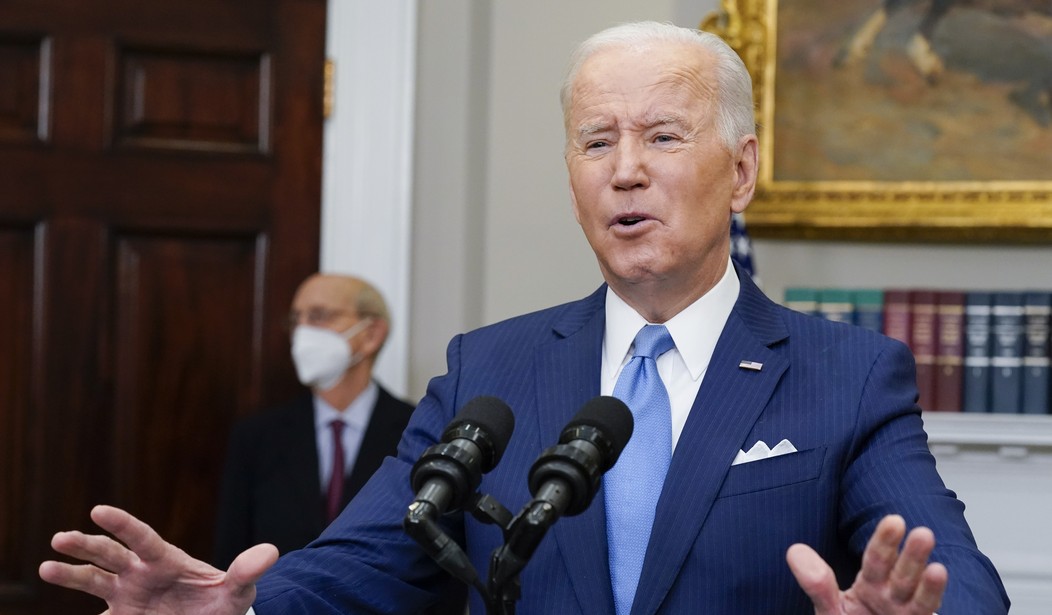Last week, in the wake of news that Justice Stephen Breyer was retiring from the U.S. Supreme Court, President Joe Biden doubled down on a campaign promise that he would nominate a Black woman to fill the vacancy. However, a supermajority of Americans are against the president using such discriminatory criteria to select his pick, according to an ABC News/Ipsos poll. On Sunday, "76% of Americans" was even trending on Twitter in reaction to news about the poll.
As the trend suggests, 76 percent of respondents want Biden to consider "all possible nominees," while just 23 percent are in favor of him sticking to his plan to limit his selection to the nominee's race and gender.
Even a majority of Democratic respondents want Biden to broaden his horizons, by 54 percent.
From an ABC News write-up by Brittany Shepherd:
Although the poll's sample size was not large enough to break out results for Black people, only a little more than 1 in 4 nonwhite Americans (28%) wish for Biden to consider only Black women for the vacancy. Democrats are more supportive of Biden's vow (46%) than Americans as a whole, but still a majority of Democrats (54%) also prefer that Biden consider all possible nominees.
While results on Supreme Court picks have been a key takeaway leading to the poll trending, it's not the only takeaway.
Slightly more Americans believe that the Supreme Court decides cases "on the basis of their partisan political views," with 43 percent selecting this response. Meanwhile, 38 percent believe it's "on the basis of law." The results are sharply partisan, in that Republicans choose the law 46 to 33 percent, while a majority of Democrats say it's a matter of politics, by 52 to 32 percent.
The Ipsos write-up highlights how "President Biden continues to lose ground with the American public on a range of issues."
The poll asked about nine issues, and the president was underwater on seven of them, and by double digits for six of them. The issues where he had higher approval than disapproval ratings were within the margin of error.
Recommended
When it comes to Biden's response to the coronavirus, just 50 percent said they approve, while 49 percent disapprove. Last January, Biden's numbers for that issue were at 69 percent approve and 29 percent disapprove. Last March, they were at 72 percent approve and 28 percent disapprove.
Just 34 percent approve of how he is handling immigration, while 64 percent disapprove. On "the economic recovery," 42 percent approve while 56 percent disapprove. When it comes to gun violence, Biden is at a 29 percent approval rating, while 69 percent disapprove. Thirty-four percent approve of how he is handling crime, while 64 percent disapprove. On "the issue with Russia and Ukraine," 41 percent approve while 56 percent disapprove. Inflation is one of the worst issues for the president, on which he has a 29 percent approval rating and a 69 percent disapproval rating.
The issues where Biden fares better include climate change, though 51 percent still disapprove while 47 percent approve. His best issue is on "Rebuilding the United States’ infrastructure," where he has a 50 percent approval rating and a 47 percent disapproval rating.
A separate question asked respondents how they would describe the state of the economy. A strong plurality, at 47 percent said "not so good," while 1 percent said "excellent," 23 percent said "good," and 28 percent said "poor."
As I examined on Friday, Biden's poor ratings on the economy are particularly noteworthy in that the DNC has been quite determined to promote certain economic successes of the administration. Such success has been marred by public perception though, and by Biden's blame from Americans on how he has been handling inflation.
Another question also asked respondents if they "support or oppose sending U.S. troops into Eastern Europe to try to discourage a Russian invasion of Ukraine," which Biden has signaled he will do in the "near term." Just 29 percent support sending troops there, while 38 percent are opposed and 32 percent responded they don't know.
The poll was conducted January 28-29, with 510 adults and a margin of error of plus or minus 4.9 percentage points.

























Join the conversation as a VIP Member